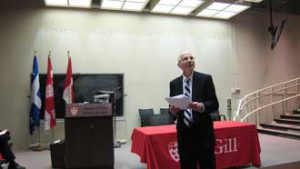
By Pascal Zamprelli
Can the global health community meet the needs of the world’s most disenfranchised people? Global health law and policy expert Lawrence Gostin believes it can, through an international convention focused on the least healthy among us.
Gostin, the Linda D. and Timothy O’Neill Chair of Global Health Law at Georgetown University, was on hand Thursday, March 25, to deliver the Second Annual Lecture in Health and Law, hosted by McGill’s Research Group on Health and Law (RGHL) and the McGill Global Health Programs, with support from the Beatty Memorial Lectures Committee
Titled “Meeting the Basic Survival Needs of the World’s Least Healthy People: Toward a Framework Convention on Global Health,” the lecture combined health law, human rights, poverty, international trade and intellectual property subjects.
Gostin explained how the international health landscape is increasingly crowded and complex, and that when global health efforts overlap, results are fragmented, and activities cease to align with country priorities and capacities.
He noted that global health funding and interventions are skewed toward emotional, high-visibility events, such as the Asian tsunami, as well as toward diseases that capture the public’s imagination (like HIV/AIDS), or that have the potential for rapid global transmission, such as SARS and influenza. Gostin argued that, instead, what is truly needed is to meet the basic survival needs for the world’s most disadvantaged people, through a Framework Convention on Global Health, which he is involved in developing with various international bodies.
“Professor Gostin was invited because of his categorical stature as a global leader in the world of health policy and health law scholarship,” said law professor Angela Campbell, Convener of the RGHL, noting his “attentiveness to the importance of academic work that yields practical results, specifically in the form of improving health outcomes within the world’s most marginalized communities.”
The RGHL seeks to promote interdisciplinary teaching and scholarship in the fields of health law and policy, often by bringing together academics and students working on these issues from a variety of academic fields. “The Annual Lecture is intended to be a catalyst for interdisciplinary exchange on new and ongoing challenges and questions that surface at the interface of health and the law.” Campbell said. “It’s about what medicine, law and policy mean to one another, what these disciplines can learn from one another.”
The lecture, which drew an impressive 100 attendees, embodied the true spirit of interdisciplinarity central to teaching and research at McGill, bringing together groups in both Law and Medicine “We were delighted to join forces in leading this event,” Campbell said. “It’s a wonderful symbol of joint efforts to build bridges between these two particular faculties and disciplines.”
Campbell was also quick to point out the crucial support received from the Beatty Memorial Lectures Committee, which exists to support public presentations delivered within the McGill community by leading international scholars, and co-sponsored the event as part of this mission.
Said Campbell, “Beatty support received this year for the lecture was both a reflection of the pre-eminent status of Professor Gostin, as well as an amazing marker of support for a scholarly initiative that aims to present cutting edge research of practical and academic relevance to a global, interdisciplinary audience.”
